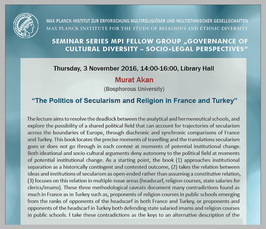"The Politics of Secularism and Religion in France and Turkey"
Seminar Series MPI Fellow Group „Governance of Cultural Diversity – Socio-Legal Perspectives“
- Datum: 03.11.2016
- Uhrzeit: 14:00 - 16:00
- Vortragender: Murat Akan (Bosphorous University)
- Murat Akan is Assistant Professor of Comparative Politics and Political Theory in the Department of Political Science and International Relations at Boğaziçi University, Istanbul. He holds a Ph.D. in Political Science (2005) from Columbia University, New York. He was a non-residential post-doctoral research fellow with the University of Amsterdam (2009-2012), and a guest researcher in-residence at the Max-Planck-Institute for the Study of Religious and Ethnic Diversity in Göttingen (2012-2013). He will be a visiting scholar in George Washington University in July and August 2017. He has a forthcoming book from Columbia University Press on secularism in France and Turkey.
- Ort: MPI-MMG, Hermann-Föge-Weg 11, Göttingen
- Raum: Library Hall

For more details please contact esser(at)mmg.mpg.de.
The lecture aims to resolve the deadlock between the analytical and hermeneutical schools, and explore the possibility of a shared political field that can account for trajectories of secularism across the boundaries of Europe, through diachronic and synchronic comparisons of France and Turkey. This book locates the precise moments of travelling and the translations secularism goes or does not go through in each context at moments of potential institutional change. Both ideational and socio-cultural arguments deny autonomy to the political field at moments of potential institutional change. As a starting point, the book (1) approaches institutional separation as a historically contingent and contested outcome, (2) takes the relation between ideas and institutions of secularism as open-ended rather than assuming a constitutive relation, (3) focuses on this relation in multiple-issue areas (headscarf, religion courses, state salaries for clerics/imams). These three methodological caveats document many contradictions found as much in France as in Turkey such as, proponents of religion courses in public schools emerging from the ranks of opponents of the headscarf in both France and Turkey, or proponents and opponents of the headscarf in Turkey both defending state salaried imams and religion courses in public schools. I take these contradictions as the keys to an alternative description of the trajectories of French and Turkish secularism and to a remapping of the political fields that account for these trajectories.